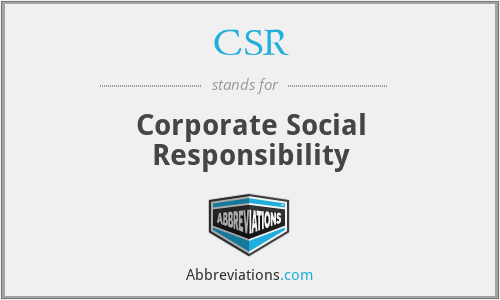What does CSR mean in Travel & Tourism?
This page is about the meanings of the acronym/abbreviation/shorthand CSR in the Community field in general and in the Travel & Tourism terminology in particular.
Corporate Social Responsibility
Submitted by conradko on September 15, 2014
Translation
Find a translation for Corporate Social Responsibility in other languages:
Select another language:
- - Select -
- 简体中文 (Chinese - Simplified)
- 繁體中文 (Chinese - Traditional)
- Español (Spanish)
- Esperanto (Esperanto)
- 日本語 (Japanese)
- Português (Portuguese)
- Deutsch (German)
- العربية (Arabic)
- Français (French)
- Русский (Russian)
- ಕನ್ನಡ (Kannada)
- 한국어 (Korean)
- עברית (Hebrew)
- Gaeilge (Irish)
- Українська (Ukrainian)
- اردو (Urdu)
- Magyar (Hungarian)
- मानक हिन्दी (Hindi)
- Indonesia (Indonesian)
- Italiano (Italian)
- தமிழ் (Tamil)
- Türkçe (Turkish)
- తెలుగు (Telugu)
- ภาษาไทย (Thai)
- Tiếng Việt (Vietnamese)
- Čeština (Czech)
- Polski (Polish)
- Bahasa Indonesia (Indonesian)
- Românește (Romanian)
- Nederlands (Dutch)
- Ελληνικά (Greek)
- Latinum (Latin)
- Svenska (Swedish)
- Dansk (Danish)
- Suomi (Finnish)
- فارسی (Persian)
- ייִדיש (Yiddish)
- հայերեն (Armenian)
- Norsk (Norwegian)
- English (English)
Definition
What does CSR mean?
- Corporate social responsibility
- Corporate social responsibility (CSR) is a form of international private business self-regulation which aims to contribute to societal goals of a philanthropic, activist, or charitable nature by engaging in or supporting volunteering or ethically oriented practices. While once it was possible to describe CSR as an internal organizational policy or a corporate ethic strategy, that time has passed as various national and international laws have been developed. Various organizations have used their authority to push it beyond individual or even industry-wide initiatives. In contrast, it has been considered a form of corporate self-regulation for some time, over the last decade or so it has moved considerably from voluntary decisions at the level of individual organizations to mandatory schemes at regional, national, and international levels. Moreover, scholars and firms are using the term "creating shared value", an extension of corporate social responsibility, to explain ways of doing business in a socially responsible way while making profits (see the detailed review article of Menghwar and Daood, 2021).Considered at the organisational level, CSR is generally understood as a strategic initiative that contributes to a brand's reputation. As such, social responsibility initiatives must coherently align with and be integrated into a business model to be successful. With some models, a firm's implementation of CSR goes beyond compliance with regulatory requirements and engages in "actions that appear to further some social good, beyond the interests of the firm and that which is required by law".Furthermore, businesses may engage in CSR for strategic or ethical purposes. From a strategic perspective, CSR can contribute to firm profits, particularly if brands voluntarily self-report both the positive and negative outcomes of their endeavors. In part, these benefits accrue by increasing positive public relations and high ethical standards to reduce business and legal risk by taking responsibility for corporate actions. CSR strategies encourage the company to make a positive impact on the environment and stakeholders including consumers, employees, investors, communities, and others. From an ethical perspective, some businesses will adopt CSR policies and practices because of the ethical beliefs of senior management: for example, the CEO of outdoor-apparel company Patagonia, Inc. argues that harming the environment is ethically objectionable. Proponents argue that corporations increase long-term profits by operating with a CSR perspective, while critics argue that CSR distracts from businesses' economic role. A 2000 study compared existing econometric studies of the relationship between social and financial performance, concluding that the contradictory results of previous studies reporting positive, negative, and neutral financial impact, were due to flawed empirical analysis and claimed when the study is properly specified, CSR has a neutral impact on financial outcomes. Critics questioned the "lofty" and sometimes "unrealistic expectations" in CSR. or that CSR is merely window-dressing, or an attempt to pre-empt the role of governments as a watchdog over powerful multinational corporations. In line with this critical perspective, political and sociological institutionalists became interested in CSR in the context of theories of globalization, neoliberalism, and late capitalism.
Popularity rank by frequency of use
How popular is CSR among other acronyms?
CSR#1#1352#12977
Embed
Citation
Use the citation below to add this abbreviation to your bibliography:
Style:MLAChicagoAPA
"CSR." Abbreviations.com. STANDS4 LLC, 2024. Web. 25 Apr. 2024. <https://www.abbreviations.com/term/1566665>.



Discuss this CSR abbreviation with the community:
Report Comment
We're doing our best to make sure our content is useful, accurate and safe.
If by any chance you spot an inappropriate comment while navigating through our website please use this form to let us know, and we'll take care of it shortly.
Attachment
You need to be logged in to favorite.
Log In